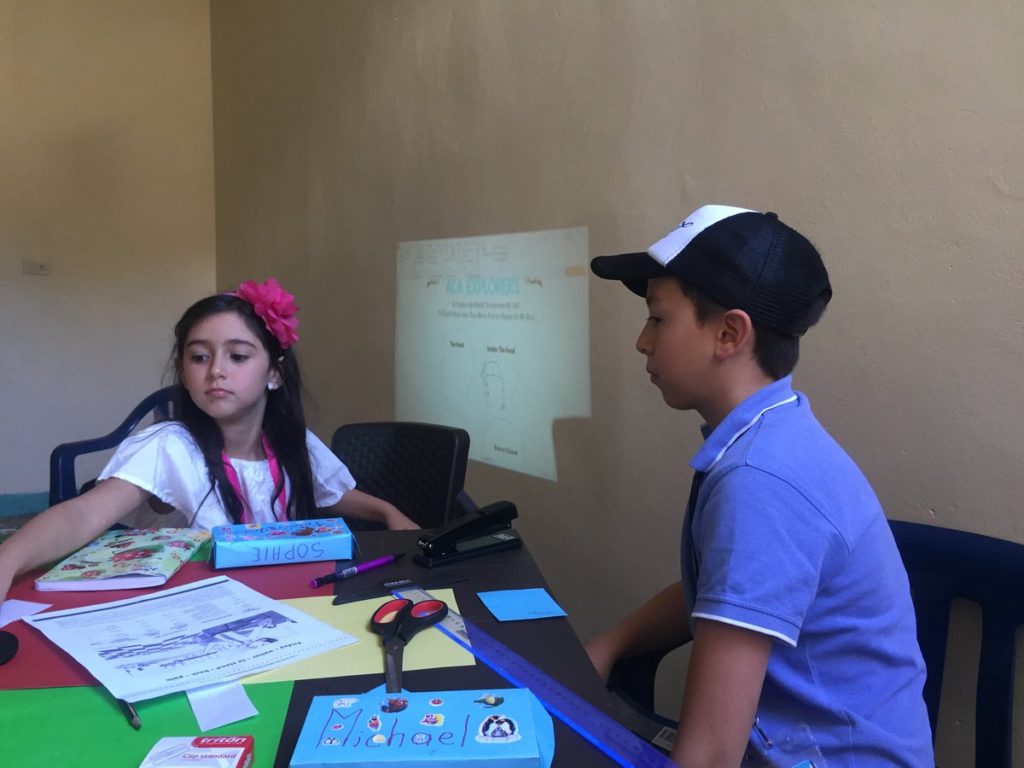Part of the challenge of being teachers in a program like ours is that we have students of many different levels of English and general education. We teach children from ages 4-12 in our outdoor classes and our Explorers are currently in the age range of 8-12 (plus a 28 year old with special needs).
One of the challenges we are constantly dealing with is how to make the material we teach comprehensible for the least advanced students and still interesting for the most advanced.
Here are some parts of our methodology that help us succeed in keeping our students of all level interested and engaged!
Teaching Creatively
As you know if you know anything about our methodology, we aren’t teaching in a conventional way. Our students aren’t sitting at desks with notebooks while we relay information for them to write down. We’re all standing up, usually in the park, and engaged physically and mentally.
This methodology helps keep even our most advanced students interested because we are making the activities fun and different. Besides the songs we always return to for their great value as quality input and output, we switch up the other activities we do a lot!
The way we teach that incorporates games and songs helps keep everyone entertained even if they are repeated for some students. The variety that our class provides is a huge plus in that new students come and new activities are presented so even our most advanced and frequent attendees can be engaged!
Independent Projects
This is an important part of the ACA method that we want to keep experimenting with and building upon. Assigning independent projects that differ based on each student’s level is the perfect way of challenging each student in their own way.
All of our Explorers have an Input Log which is an ongoing independent project. This input log is for them to record things they have watched, read or listened to in English. For now, as most of their reading skills in English are low, it’s mostly movies/shows/songs. This is a great project because of all the freedom it gives them! They can expose themselves to as much or as little as they want and of any level they feel comfortable with!
We want to continue incorporating individual projects to motivate each student at their own level. We recognize the diversity of our students’ levels of knowledge and want to push them all to learn as much as they can. As we embark upon this new school year, we hope to discover more topics with our students that excite and interest them!
Making Our Students the Teachers
Part of advancing through the levels of our program is teaching classes to the rest of the students. Our Explorers are currently on the first sub-level, Scholar, of level one. To advance to the next sub-level, Philosopher, they have to teach a class to the rest of the students. They have some freedom in deciding what they teach but it needs to be English-based and should include some activities we have done in the class before. It tests their knowledge of the activities we have done while also giving them room to be creative in inventing new activities, games or even songs to share with their classmates!
Teaching is challenging. Giving our students exposure to coming up with lesson plans, talking in front of the whole class and giving their peers tasks to do is a great experience for them to have. It requires confidence, creativity and independence.
Follow their Own Interests
Having independent projects allows our students to follow their own interests! For example, with the Input Log, our students have full freedom of choice on what they want to watch or listen to. Also, when they have to teach a class, they can focus more on what interests them personally- songs, games, pronunciation activities, science, whatever! Allowing them to follow their own interests inherently challenges them to learn more about what they’re interested in and share it with the rest of us in an attempt to make it interesting to others!
It is important to us that our students learn things that they are passionate about. While a lot of what we do is predetermined because we know it will help them learn best, we always want to leave some room for choice and personal expression!
Self-Assessment
Self-assessment is a great way to keep our students motivated and challenged. We are developing all these study habits, homework logs, the Lichtener boxes and many other forms of self-assessment. Self-assessment is important because it makes us responsible for ourselves- our achievements and our failures.
It is also great real life practice. It’s hard being an adult and having to find intrinsic motivation for the things you have to do! The more our students learn to self-assess the better students they will be throughout their lives and the more responsible they will become for their actions. Self-assessment is challenging because we want to always say we have done our best. It requires us to be honest with ourselves and continue to push ourselves.
These are just some of the ways we maintain a balance between all the different levels of learning that our students have. What are some other ways you make sure all your students are learning and challenged?
